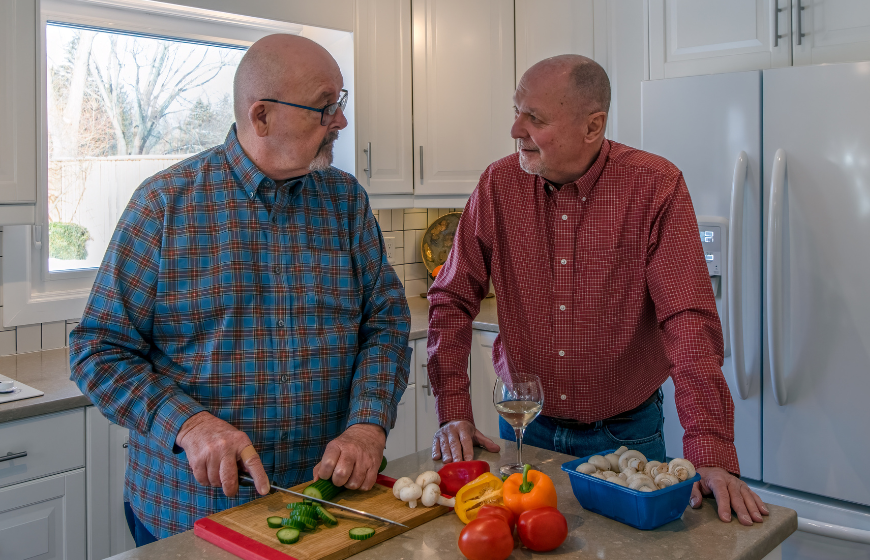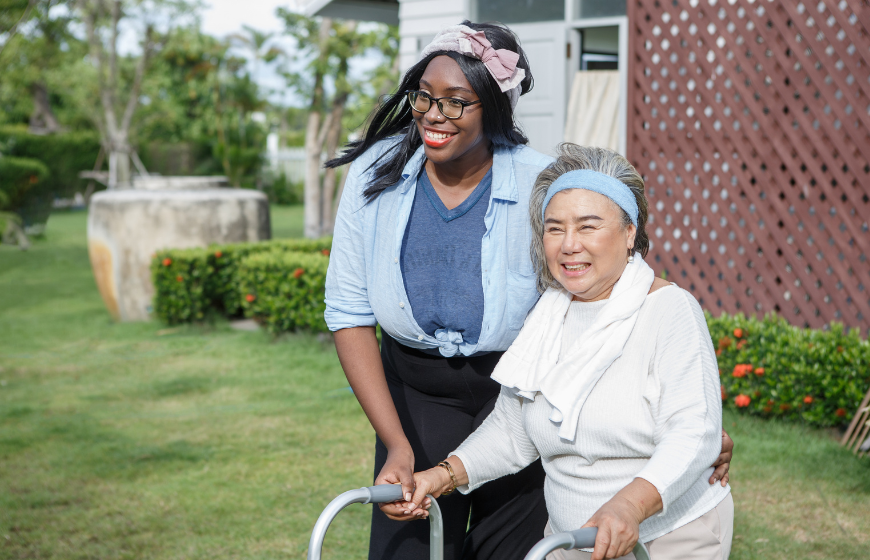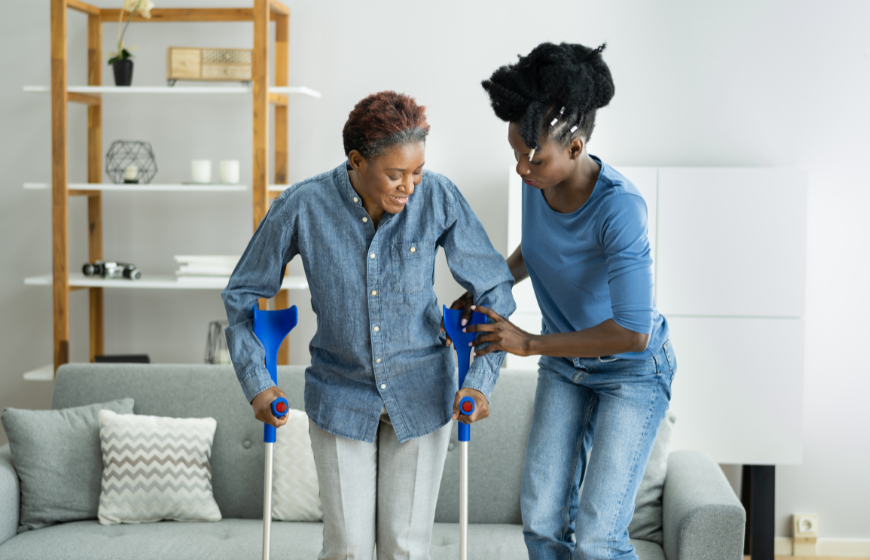Are you looking for long-term care options for your mom, dad, or grandparent?
If so, there are several viable paths and types of long term care you could possibly take, whether it’s a retirement community, a medically-based senior assistance living community, or aging at home with the assistance of non medical senior care or home medical assistance.
Here, the familial calculus depends on your loved one’s physical fitness and mental acuity. If their health is in relatively good standing, non medical home care services may be the best option.
But what is it? And why is it such a good option for healthy seniors?
This guide will cover everything you need to know about non medical home health care and benefits of home care, so you can determine whether it’s right for your family member.
What Is Non Medical Home Health Care?
According to the non profit Capital Caring Health:1 “90% of adults over the age of 50—across all age, race, income and health status categories—wish to remain at home and ‘age in place.’”
From both a place of emotion and practicality, it’s clear that the overwhelming majority of people believe that home is where the heart is.
As the name implies, non medical home care service focuses on providing assistance to elderly who are healthy and mentally fit but whose bodily functions have gradually diminished, thus making certain activities of daily living (ADLs) difficult, dangerous, or impossible to do on their own.
Sometimes referred to as private duty care, this was once reserved for short-term usage, typically for individuals recovering at-home from a hospitalization or surgery. But, recently, it’s become a popular way that seniors can age in place, since it allows them to maintain their autonomy and comfort, while ensuring that they’re safe and don’t feel lonely.
And the level of care depends on each case. Some seniors may only need a few hours of assistance, whereas others require a 24/7 live-in non medical care provider.
Types of Non Medical Care
There are two primary categories of non medical in-home care services. While they may share some similarities, the care provider may have different focuses or tasks they assist with. They include:
- Companion care – A home companion serves as a friend and confidant, helping with household chores and life tasks like:
- Shopping for groceries
- Planning and prepping meals
- Housekeeping
- Playing games and socializing
- Driving them to doctors appointments
- Helping with trips and outings
- Personal care – A higher level of non medical senior care, in–home care service providers give hands-on help with routine daily personal tasks, such as:
- Eating
- Bathing
- Showering
- Dressing
- Grooming
- Moving around
- Taking medications
Generally speaking, personal care assistance will cost more since it tends to be more demanding. As a result, the care provider will often have additional qualifications and training, or a background in senior assisted living.
What Are the Costs of Non Medical Senior Care?
According to a survey by Genworth Financial, the median cost of care and charges associated with homemaker services across the country was $4,481 per month, which extrapolates to $53,768 per year.2 That said, there are a range of factors that can impact the cost of non medical senior care, including:
- Location – The state you live in can significantly impact the cost of care. For instance, the median cost for full-time care in Alabama is $41,184 compared to $70,356 in Minnesota.2
- Hours served – Is the senior companion working 10 hours a week or 60? Naturally, the amount of hours worked and the time these hours occur will increase the price of care. For instance, overnight care may cost more than day care.
- Services rendered – Assisting with bathing and using the restroom is much more labor intensive and demanding than playing games. The levels of care provided will naturally impact prices.
- Healthcare coverage – Depending on the senior and their insurance plan, non medical personal care could be covered if not heavily discounted. Plans like Medicaid and Medicare may not offer 24/7 coverage but at least may provide partial coverage for part-time assistance.
Non Medical Home Care Services vs. Home-Based Medical Care Services
Home healthcare may have some overlap with non medical care, except it also provides medical assistance to seniors who require it. The home healthcare is typically provided by a qualified professional, be they an attending doctor, registered nurse, physical therapist, occupational therapist, or speech therapist. According to CMS:3
The home health staff provides and helps coordinate the care and/or therapy your doctor orders. Along with the doctor, home health staff create a plan of care, which is a written plan for your care. It tells what services you will get to reach and keep your best physical, mental, and social well-being. The home health staff keeps your doctor up-to-date on how you are doing and updates your plan of care as needed, as authorized by your doctor.
This is the most comprehensive of the senior in-home care services. It may be reserved for seniors who want to recover at home or who live with an illness or infirmity. Qualified professionals may provide medical services, such as:
- Assistance with tubes, catheters, etc.
- Medication administration
- Injection administration
- Vitals monitoring
- Wound dressing
- Nursing care
- Physical therapy
- Occupational therapy
As a result, home health care tends to be more expensive than non medical senior care. How much more depends again on the levels of care provided, the hours worked, and your location.
Benefits of Non Medical Senior Care
Are you wondering whether or not non medical senior care is right for your loved one?
If so, as you weigh your options, keep in mind the various benefits that come with this type of service:
Dignity
As they age, many seniors wish to maintain a sense of personal autonomy and control over their daily lives. Even if their capabilities are diminishing with the passage of time, a large percentage of elderly still adamantly yearn for agency.
Being able to go about their routine—albeit with assistance—empowers seniors to still live fulfilled and relatively normal lives. It helps them feel dignified, which is often missing in a senior living community where they might have much less of a say over their daily living.
Companionship
One of the most important services a non medical care provider offers is companionship. Humans are social creatures. Having someone around can provide comfort, entertainment, support, and attention—all of which helps seniors live in dignity and can improve both their mental and physical health. As the NIH points out:4
Research has linked social isolation and loneliness to higher risks for a variety of physical and mental conditions: high blood pressure, heart disease, obesity, a weakened immune system, anxiety, depression, cognitive decline, Alzheimer’s disease, and even death.
With a home care provider around, seniors have someone to talk to, play games with, or simply be around. Just having a friendly face can do wonders to their health and happiness. This can also slow down or prevent old age diseases in some individuals. Diseases like alzehimer can worsen when the brain function, or mental function, is destroyed, and not having companionship can be a cause of that.
Control
As you age, you tend to lose control. Not just of your mind and body, but also of your personal decision making.
In a senior living community, for instance, a resident may be subject to the schedule or strictures set out by medical care providers. On any given day, they may receive a constant deluge of marching orders that tell them when to eat, where to go, what daily activities to do, or what medicines to take.
While having regimentation is important, it can easily become overwhelming for seniors, making them feel as if they have little to no control over their lives. But with at-home non medical care, they have much greater control over what they do and where they go. Seniors get to set their own schedules or stick to their preferred routines.
Safety & Privacy
Compared to living alone, non medical senior care is much safer. Having a helping hand around can reduce the chances of a slip and fall or a medical issue going unnoticed and untreated.
Additionally, you can tailor the level and time of care to your loved one. If they’d prefer to have greater privacy and only require a few hours of assistance on a weekly basis, that’s possible. Each case is different. Seniors and their families can work with the non medical senior care provider to custom-make a schedule.
Lower Costs
Non medical care is already cheaper than medical home care. But compared to a full-time stay at a senior living community, which averages $100,000 annually, it’s even less costly.2
Alliance Homecare—Helping You See if Non Medical Senior Care Is Right for You
So, how do you know if non medical senior care is right for you?
Ask the following questions:
- Is your loved one relatively healthy?
- Do they need some assistance with ADLs?
- Would they prefer to stay at home?
- Do you want to save money in the long run?
If you answered yes to these, chances are, this would be the ideal way to let a person age in place without sacrificing their dignity, independence, or control.
Here, Alliance Homecare can assist. Whether you require medical or non medical at home services, we offer high-quality care across the entire age spectrum with a customized personal care plan.
Are you ready to get your mom or dad the home care help they require? Contact us today to learn more about in home nurse care.
Sources:
- Global News Wire. Nearly 90% of Americans Age 50 and Older Want to “Age in Place”. https://www.globenewswire.com/news-release/2021/05/10/2226492/0/en/NEARLY-90-OF-AMERICANS-AGE-50-AND-OLDER-WANT-TO-AGE-IN-PLACE.html
- Genworth. Genworth Cost of Care Survey. https://pro.genworth.com/riiproweb/productinfo/pdf/282102.pdf
- CMS. Medicare and Home Health Care. https://www.cms.gov/Medicare/Quality-Initiatives-Patient-Assessment-Instruments/HomeHealthQualityInits/Downloads/HHQIHHBenefits.pdf
- NIA. Social isolation, loneliness in older people pose health risks. https://www.nia.nih.gov/news/social-isolation-loneliness-older-people-pose-health-risks




